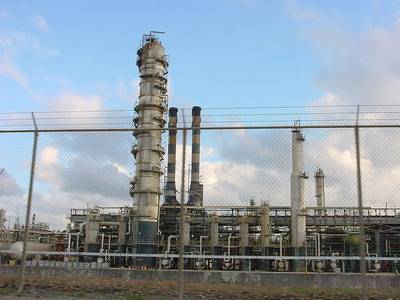Idled St. Croix Refinery Risks Explosion, 'Catastrophic' Releases
Equipment corrosion at an oil refinery in the U.S. Virgin Islands presents a risk of fire, explosion or other "catastrophic" releases of hazardous substances, U.S. environmental regulators said on Tuesday, after performing an inspection last month.
The idled St. Croix refinery, formerly called Limetree Bay, was shut down by the U.S. Environmental Protection Agency in May 2021 after a series of chemical releases into the environment sickened neighboring residents. The refinery was sold in December 2021 for $62 million to West Indies Petroleum and Port Hamilton Refining and Transportation, following the bankruptcy of its former private equity owners.
An August 2022 fire within the petroleum coke conveyor loading system burned for two weeks, prompting the inspection, an EPA regional administrator said in an Oct. 13 letter sent to the owners' lawyers and made public on Tuesday.
Inspectors found corrosion on process valves, flanges, pipes, nuts, bolts and pressure relief devies, adding that gaskets were in poor condition. The owners also failed to provide hazard assessments and other documentation for the facility, the EPA said.
They were particularly concerned about equipment containing ammonia, which can irritate or burn the eyes and skin, and liquefied petroleum gas (LPG), which can cause nausea and headaches. The chemicals, they say, present "serious health consequences" to facility workers and the general public if released.
Failure to safely maintain equipment that contains hazardous materials violates part of the Clean Air Act, according to the letter.
The refinery was sold in December 2021 for $62 million to West Indies Petroleum, a Jamaican oil storage company that intends to operate the facility. Private equity investors including Arclight and EIG had poured $4.1 billion into reviving the aging refinery - formerly the largest in the Western Hemisphere - before filing for bankruptcy in September 2021.
Port Hamilton Refining did not respond to a request for comment. In June, West Indies Petroleum denied its ownership of the facility, though the EPA has said it does.
Port Hamilton Refining has said it intends to work with the EPA toward restarting the plant next year, but faces steep financial and regulatory hurdles.
The new owners will need to negotiate a consent decree with the U.S. Department of Justice (DOJ) which will involve payment for hundreds of millions of dollars of new pollution equipment previous owners had failed to install, the DOJ said in March.
The EPA said it would call for an independent expert to assess the ammonia- and LPG-containing equipment to determine whether the materials can be safely secured, and if not, safely remove them.
The owners cannot sell ammonia from the facility without EPA approval, the regulators added.
(Reuters - Reporting by Laura Sanicola; Editing by Mark Porter, Aurora Ellis and Josie Kao)











